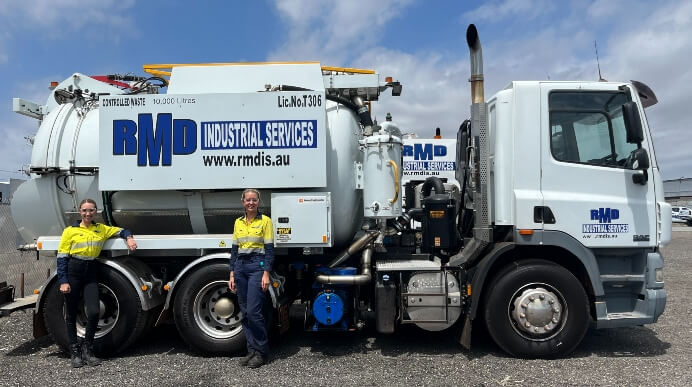
The next generation is bringing with it new energy and vigour as they embark on a career in waste and resource recovery.
Enthusiasm and passion, tech-savvy skills, and new perspectives – just some of the benefits of hiring young talent.
Katy Rogers and Annie Ullinger bring all in spades to their new roles at Pure Environmental.
While both admit working in the waste industry was an accidental career path, it’s one they’re revelling in.
“It’s not where I saw myself heading, but I now don’t imagine doing anything else,” says Katy. “I like that no two days are the same. I work outside, and there’s a lot of variety in the role. You react to what’s going on at the time.”
Studying in the United Kingdom, 26-year-old industrial chemist Katy, wanted to work in a lab – until she saw how repetitive it was and realised it wasn’t for her.
When a recruiter called and offered a job in a transfer station Katy says she had no idea what the job entailed but said ‘yes’.
She doesn’t ever remember the waste industry being offered as a career path to students and says it’s not an industry you often hear about outside of the people who are working in it.
“The first time you tell anyone what you do they look confused,” Katy says. “I used to say I was an industrial bin man, that was my go-to description.”
Katy’s now part of a 10-strong technical working group that share’s ideas across Pure Environmental’s national sites. Pure provides liquid waste removal and treatment services. It’s Katy’s job to analyse the waste that comes on site and decide the best disposal or treatment method.
Six months into the role, she’s come across some challenges, not least the differences between waste treatment in Australia and the UK.
“We don’t have controlled waste in the UK, it’s either non-dangerous or dangerous goods,” Katy says. “And the amount of landfilling in Australia is way more than in the UK where a lot of waste is exported.
“What’s allowed to be landfilled in Australia is definitely a surprise.”
New products, chemicals and regulations in an evolving industry mean Katy is constantly learning. While that’s one of the drawcards, so is being able to work in an industry that is making a difference.
“We’re dealing with hazardous material and it’s all about protecting the environment,” she says. “That’s a strong selling point. Not everyone does what we do.”
Twenty-seven-year-old Health, Safety and Environment advisor Annie’s, path into the waste sector has been a circular one. She studied environmental management at university before stepping into an administration and then health and safety role in the construction industry.
She began with Pure Environmental in September 2023 and says while her university studies were broad, there are synergies with her current role including care planning, rehabilitation, and water sampling.
“Waste is a very environmentally managed industry,” Annie says.
“That’s, especially so here at Pure, where we recycle many different types of waste and try to recover as many resources as we can.”
Annie is working across three sites, understanding the health and safety management systems, and rolling out risk management and critical controls.
“You think of waste, and you think of a big rubbish truck and tip,” she says. “But it’s so diverse. When you bring in the environmental aspect, and what can be done with waste, it puts a different perspective on it.”
Annie says coming into the industry with fresh eyes is an advantage and encourages others not to overlook the diversity of roles within the sector.
Elliot Ruseler, Pure Environmental’s General Manager – Commercial, says it’s a misnomer that you must be a garbo to find yourself in the waste industry. He says the next generation is helping to dispel that image.
“The waste industry is constantly evolving and the need for new and fresh ideas is essential to keep pace,” Elliot says.
“Historically it has been a challenge to attract new talent into the industry, but with increased focus on the circular economy and the environment, the industry is becoming increasingly appealing to the younger generation wanting to make a sustainable difference.
“With a new generation comes a new way of thinking that benefits the entire team.”


Pure Environmental is committed to innovation, sustainability, and efficient solutions in waste management. This mission and vision drive our dedicated efforts.